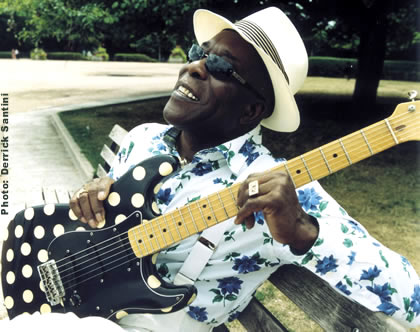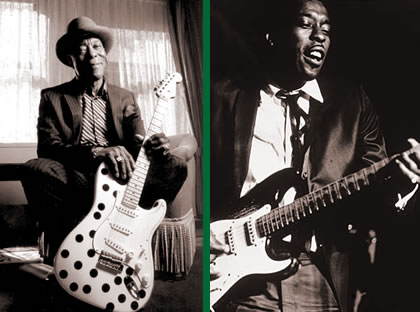
CAN'T QUIT THE BLUES • Buddy Guy [3 CDs + DVD]
Let me get this off my chest right at the start: regardless of his protestations to the contrary, in print and on the terrific documentary and performance DVD enclosed in this boxed set, Buddy Guy's greatest work was done during his Chess, Delmark, and Vanguard years. Despite the claims of Guy (and some gullible critics) that during those years his "hands were tied behind his back," that those recordings were unrepresentative of his live energy, and the implication that if only "the man" had let him loose he could have been as big as Hendrix, the audio and visual record just doesn't reflect it. One need only reference the audio and video here to learn that all the energy, passion and talent in his possession is quite evident in the breathtaking guitar and vocal work on recordings like "Ten Years Ago" (Chess 1960), "In The Wee Hours" (Delmark 1965), and "One Room Country Shack" (Vanguard 1968). What you get in later years is too often loud, out of control, distorted guitar, sloppily played, and a lot of grandstanding to white, rock-raised, frat-boy audiences who want to see the bluesman go crazy.
Far be it from me to begrudge Buddy Guy the financial success that has come in his later years--hell, he is one of my guitar heroes--but the fact remains that, artistically, his peak recording years were his early ones. Which makes it unfortunate that they are restricted to only one of the four discs here, and not as well chosen as they might have been. If you are going to license only two Delmark tracks from his spectacular sideman work with Junior Wells, why waste one on a cut where he only plays chordal rhythm when there are many better instances of his unique style on that same recording. And while we are at it, simply including the incredible live solo on "Look How Baby," from the Vanguard Junior Wells release It's My Life, Baby, would have, in one fell swoop, summed up the controlled lunacy of the style that at its height, during the Sixties, so influenced a young Jeff Beck.
Though his best years are limited to the first disc, that is not to say that the two later discs contain all dross. It was not Guy's talent that deserted him, it was his direction. Despite this set's title, he did, in fact, often quit the blues. Much of the well-meaning John Porter production on Disc 2 involves placing him in modern rock, funk, and soul settings that don't seem to fit him. Still, as late as 1994, when teamed with a simpatico rhythm section for Fenton Robinson's "7-11," Guy shows that, though he may have strayed from the blues, they have never left him. Disc 3 documents producer Dennis Herring's experiment: bring Guy back to his roots in the deep South (he was born in Louisiana) by having him cover the late Junior Kimbough's Mississippi juke-joint drones. The Chicago bluesman definitely delivers some more heartfelt performances on tunes like "Done Got Old," and Herring surely improves a guitar tone that had often degenerated into an un-musical screeching during the 80s and 90s, but the experiment would still have to be considered a failed one. It is Buddy's acoustic work on this disc that is the standout. Though he believed that cranking up his electric would be his key to the bank (and in a way it was), Buddy never learned the techniques that allowed players like Hendrix, Beck, and Clapton to turn up and sound good. Listening to the man on acoustic, you hear that the sound that places him in the pantheon is in his fingers and soul, not in amplitude.
Despite my caveats, there are gems scattered through this set, and Disc 4 alone makes it worth purchasing. The documentary, "My Time After A While," contains wonderful stories about his life and times, as well as amazing footage of Guy in his young-turk prime from the American Blues Festival series (itself a must-own set). Also, the first four separate concert performances with Junior Wells in '74 and '78 show Guy displaying the jazz-like interaction with Wells that was part of their magical chemistry. The later solo performances show that while he can still deliver the goods, these days he too often confuses entertaining with pandering. Still, the final acoustic performances, from Martin Scorcese's Lightnin' In A Bottle movie, amply demonstrate why Buddy Guy is a national treasure, and one of the last of his ilk. • Michael Ross

return to covers listen to clips buy it here
buddyguy.com more about Buddy Guy